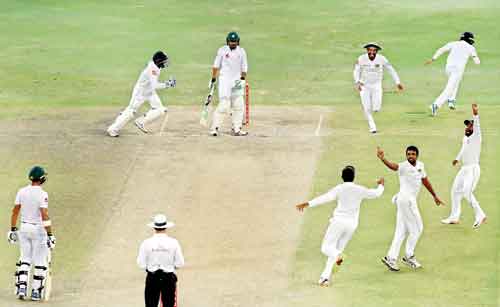The good side of Lanka’s cricket debacle
View(s):
Sri Lanka beat Pakistan in the recent test series in UAE
I remember, once a prominent former national cricketer, who was also a member of the 1996 World-Cup-winning lineup, saying, the worst thing that happened to Sri Lanka cricket was winning the title, perhaps a bit prematurely. He was of the opinion they were not yet geared to handle a sudden windfall.
The former cricketer’s contention was that though Sri Lanka lost all their trepidation on taking on the big guns in world cricket and became a true member of the international cricket community, the Lankans were not equipped to handle the sudden fame and fortunes that came with it.
He brought the argument that, after the lot of cricketers who came on stage in the near pre-1996 era, culminating with the talent of Rangana Herath in the mid 2000s, the rest of the cricketers are not of true International Class.
I gave it a lot of thought, but recently, I was listening to a speech by another World-Cup-winning member – Kumara Dharmasena. At present, he is right on top of the cricket mountain, as a member of the ICC elite umpires panel. Unlike many others, he is privy to how things happen in the ICC world. At the same time, he is also aware of what’s happening in the international cricket scene; how modules that various top rated teams adopt to keep abreast with others and stay competitive.
During the meeting, he unravelled to the audience, consisting mostly of school cricket coaches and officials, that while the rest of the cricket community have made progress in technology and other related matters, Sri Lankan cricket has been stagnant since the World Cup win.
In reality, a handful of cricketers such as Roshan Mahanama, Mahela Jayawardena and Kumara Dharmasena are voicing their opinion and trying to make people aware of the situation at hand.
What was transpiring during the post-World Cup period is rather gross. From 1996 up to date, Sri Lanka cricket was either ruled by the Sumathipala, Dharmadasa and Ranatunga family or, some concerned interim committee members who were installed by the government. Yet the Interim Committee members were only making a vain attempt to row against the tide of insufficient time.
Yet, we must admit that the major share of that domination of the rule was done by Thilanga Sumathipala, allegedly through vote manipulation.
At the same time, it must also be said that, though we mentioned that the advent of true international cricketers dried out since the entry of Rangana Herath, we Lankans have an inherent aptitude to sport and, as cricket is Sri Lanka’s major sport, the talent intake is interminable. However, because of the shortsighted policies of the cricket administrators, the methods of cricket training prevalent in 1996 did not develop to face the real international challenges.
The deterioration was gradual. Well, the Musings saw it coming for the past decade or more, and we kept moaning about it. But, the Sanga, Mahela, Murali, Jayasuriya, Dilshan, Vaas combinations kept performing with positive results, and cricket’s governing bodies felt pretty safe. So, they concentrated mostly on vote generating exercises, rather than developing infrastructure. If you doubt my word, just walk to the Max Academy at the R. Premadasa Stadium even now, and you can see the dilapidated state of affairs. Now, at the moment, they have decapitated half of the SLC building to set up the brain centre but, without a proper up-to-date ground facility; so how could they translate the Brain Centre into positive cricket results?
Going by what the former National cricketer said – “The worst thing that happened to Lankan cricket was winning the 1996 World Cup”; I assume that the best thing that happened to Sri Lanka cricket was the cricket debacle that it faced during the past year or so. Comprehensively losing to low placed cricketing nations such as Bangladesh and Zimbabwe and not being competitive against India dealt a knock-out blow to Lanka’s cricket resolve.
Cricket lovers openly began to discuss the effectiveness of cricket’s administration. Mind you, the average cricket lover in this country is sufficiently intelligent to realise where the fault lies. Even when the cricket brethren protested against the debacle, they did not target the players. The cricketing public may have booed the Lankan cricket officialdom, but there was not a murmur against the Lankan cricketers.
In fact, it was the reality of the situation that brought upon some sanity into Sri Lanka cricket. As a cricketer, Sanath Jayasuriya still remains great, and his contribution cannot be emulated by anyone in a hurry. But, his last tenure as chairman of the cricket selection committee, cricket-wise had a reverse effect. I still wonder if it is Jayasuriya alone who was responsible for this situation or, was it the work of another unparliamentary alliance. But, the fact was that, finally, Jayasuriya and company had to resign amidst a public outcry. Following that was the march of the ICC anti-corruption sleuths, who reportedly had some serious questions to ask from several work related personnel – high and low. As we know, the ICC meeting in the land of the Kiwi will be crucial for the Lankans and it is said that some of the closed doors may be opened.
At the same time, under the prevailing heat, even Sumathipala and company are more than subdued. Even a whiff of a win would have the whole basket of barracudas barracked in the venue’s VIP lounges. But, ironically, none were to be seen during the past two Test matches which Sri Lanka won handsomely.
Nevertheless, the best thing that happened was the setting up of the Aravinda de Silva committee initiated by the Sports Minister. People of the calibre of Mahela Jayawardena and Kumar Sangakkara are there to make a difference. They are people who know the ground reality and what is needed in International cricket today.
 At the same time, they are not there to run the day-to-day cricket. They are there trying to set up a formula that is going to work for Sri Lanka cricket and its future. It is said that they are looking at the idea of a constitution change something similar to what justice Prasanna Jayawardena suggested during the Sidath Wettimuny Interim Committee. At the same time, a change of the local cricket format that was once suggested by Mahela Jayawardena, also during the Wettimuny administration and thrown out as soon as the Sumathipala Constitution assumed power, is to be effected.
At the same time, they are not there to run the day-to-day cricket. They are there trying to set up a formula that is going to work for Sri Lanka cricket and its future. It is said that they are looking at the idea of a constitution change something similar to what justice Prasanna Jayawardena suggested during the Sidath Wettimuny Interim Committee. At the same time, a change of the local cricket format that was once suggested by Mahela Jayawardena, also during the Wettimuny administration and thrown out as soon as the Sumathipala Constitution assumed power, is to be effected.
Another encouraging development is the school cricket drive that was mooted by the Ministry of Education. Here people in the calibre of Sidath Wettimuny, Roshan Mahanama, Muttiah Muralitharan and once again Mahela Jayawardena have put their heads together to make a notable difference in this sphere of activity.
If this works, the clear winner is Sri Lanka cricket.
Yet, I stress this point. All this became a possibility because of the recent debacle. Because of the debacle people began to scrutinise the ground realities. If not for the debacle, people such as Mahela, Sanga and Aravinda would not have sat at the same table looking for plausible solutions.
So don’t you agree that the present cricket crisis was the catalyst?


